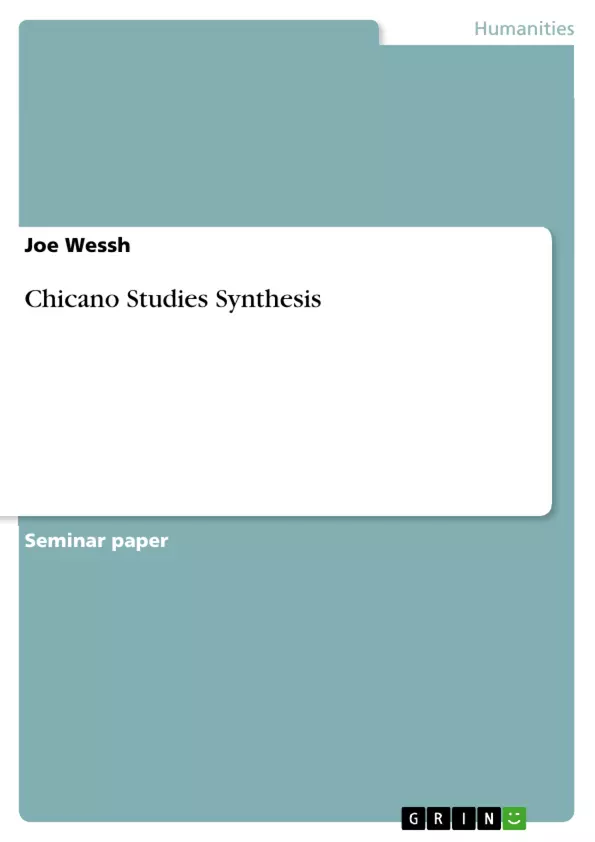The readings from the previous sessions have majorly focused on the issue of racism and discrimination of minority groups in the United States. In fact, the race has been used by the white community as a tool to stereotype minority groups such as the Chicanos and Latinos. The readings illustrate how American people tend to treat immigrants with disrespect and make it challenging for them to be incorporated into the American community. As a result, the immigrants have a hard time feeling so isolated, ignored and fear to participate in issues that are mandatory such as education. The articles explored in this paper presents historical accounts of the Mexican and Latino immigrants, the problems they encounter when interacting with Americans, and the influence that immigrants bring into the American society.
Inhaltsverzeichnis (Table of Contents)
- Chicano Studies Synthesis
- Recuperating Histories of Violence in the Americas: Vernacular History-Making on the US-Mexico Border
- Nuestra América: Latino History as United States History
- City of Inmates: Conquest, Rebellion, and the Rise of Human Caging in Los Angeles, 1771-1965
- An Eliminatory Option
- Bad Indians: A Tribal Memoir
Zielsetzung und Themenschwerpunkte (Objectives and Key Themes)
This paper explores the historical experiences of Chicano and Latino immigrants in the United States, focusing on the systemic racism, discrimination, and oppression they faced. The author analyzes several key texts to reveal the complex history of this group and its ongoing struggle for recognition and inclusion in American society.
- Historical accounts of Mexican and Latino immigrants in the United States
- State violence and social control along the US-Mexico border
- The role of incarceration and the criminal justice system in the oppression of minority groups
- The impact of colonialism and racial prejudice on the lives of indigenous populations
- The persistent presence of racism and discrimination in contemporary American society
Zusammenfassung der Kapitel (Chapter Summaries)
- Chicano Studies Synthesis: This introductory chapter sets the stage for the paper by discussing the broader context of racism and discrimination against minority groups in the United States. It introduces the key authors and texts that will be analyzed throughout the paper.
- Recuperating Histories of Violence in the Americas: Monica Muñoz Martinez's article examines the history of state violence along the US-Mexico border, focusing on the targeting of minority populations for manual labor and the culture of impunity that enabled these practices. Martinez highlights the narratives of resistance and the struggles for power between the state and citizens.
- Nuestra América: Latino History as United States History: Vicki L. Ruiz's article challenges the narrow understanding of Latino history in the United States, demonstrating the long and rich history of Latinos in the country. The article explores three critical historical moments: the US-Mexican War, the Filipino-Cuban-Spanish-American War, and the post-Second World War era, illustrating the contributions and struggles of Latinos.
- City of Inmates: Conquest, Rebellion, and the Rise of Human Caging in Los Angeles, 1771-1965: Kelly Lytle Hernandez's book delves into the history of incarceration in Los Angeles, exposing the systemic use of prisons to control and oppress minority populations. The first chapter, "An Eliminatory Option," explores the origins of the prison system in Los Angeles and the historical targeting of indigenous populations.
- Bad Indians: A Tribal Memoir: Deborah A. Miranda's memoir provides a personal account of the history of her family and the mistreatment of indigenous people in California. She exposes the violence, theft, and oppression inflicted on the Tongva-Gabrielino tribe by Spanish colonists and the ongoing struggle for recognition and justice.
Schlüsselwörter (Keywords)
This work focuses on the experiences of Chicano and Latino immigrants in the United States, examining themes of racism, discrimination, state violence, incarceration, colonialism, and indigenous history. The text draws on scholarly research, historical accounts, and personal narratives to shed light on the persistent challenges faced by these communities.
Frequently Asked Questions
What is the main focus of the Chicano Studies Synthesis?
The synthesis focuses on the historical experiences of Chicano and Latino immigrants in the United States, specifically analyzing systemic racism, discrimination, and the struggle for social inclusion.
Which historical periods are explored regarding Latino history?
The text explores three critical moments: the US-Mexican War, the Filipino-Cuban-Spanish-American War, and the post-Second World War era.
What does Monica Muñoz Martinez's research highlight?
Martinez examines the history of state violence along the US-Mexico border and the narratives of resistance among minority populations targeted for manual labor.
How is the issue of incarceration addressed in this paper?
The paper analyzes Kelly Lytle Hernandez's "City of Inmates," which exposes how the prison system in Los Angeles has historically been used to control and oppress minority and indigenous populations.
What is the significance of Deborah A. Miranda’s "Bad Indians"?
It provides a personal tribal memoir detailing the mistreatment of indigenous people in California, specifically the Tongva-Gabrielino tribe, by Spanish colonists.
What are the key themes regarding the US-Mexico border?
Key themes include state violence, social control, manual labor exploitation, and the culture of impunity that enabled discriminatory practices.
- Quote paper
- Joe Wessh (Author), 2018, Chicano Studies Synthesis, Munich, GRIN Verlag, https://www.grin.com/document/494060



